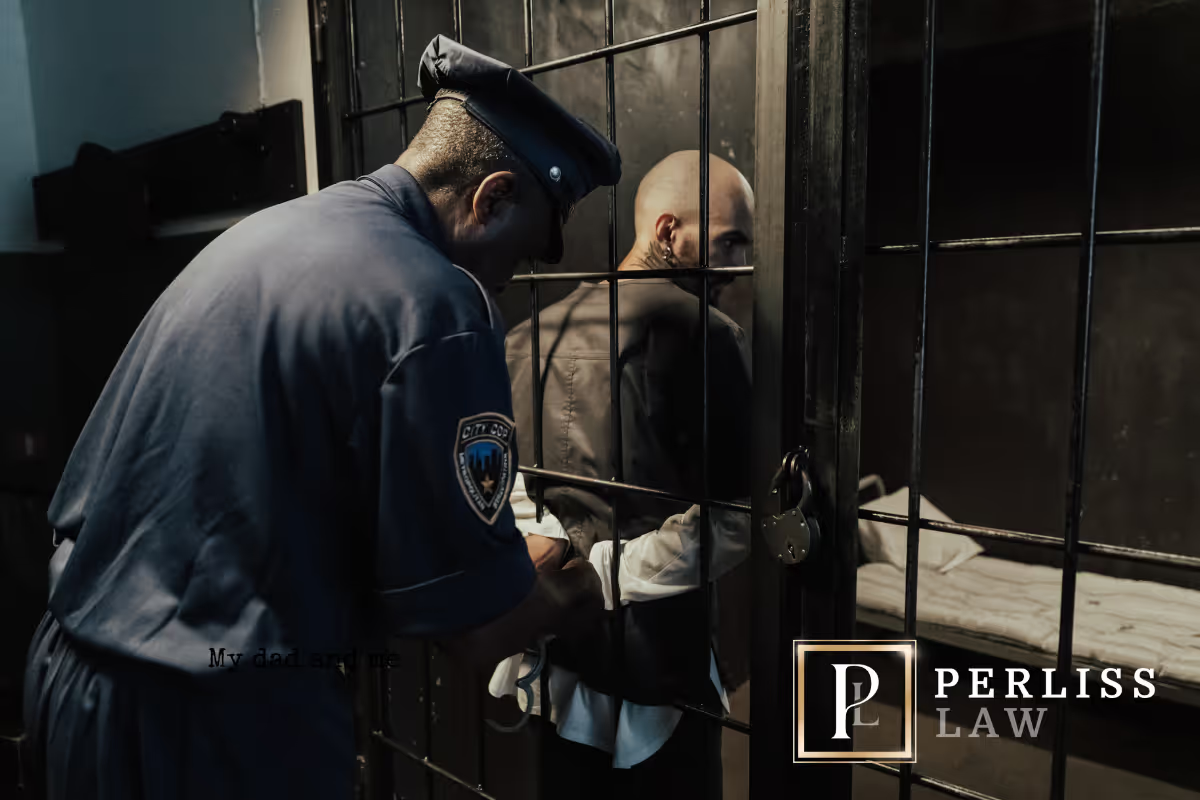ICE Arrests Are Increasing. Detained or facing deportation? We can help with bond hearings and removal defense.
ICE Arrests Are Increasing.
Learn More
Learning that a criminal complaint has been filed against you can be one of the most frightening experiences of your life. In that moment, your world shifts as you enter the criminal justice system—a complex legal maze with serious consequences that can affect your freedom, reputation, and future.
A criminal complaint is a formal legal document sworn under oath that alleges you committed specific crimes at particular times and locations. Unlike rumors or accusations, this document initiates official legal proceedings against you and creates a permanent record in the criminal justice system.
Understanding what happens when a criminal complaint is filed against you is crucial for protecting your rights and making informed decisions about your defense. This comprehensive guide will walk you through every stage of the process, from the immediate consequences of filing to long-term impacts on your life, helping you navigate this challenging situation with knowledge and confidence.
When a criminal complaint is filed against you, several immediate procedural steps occur that set the criminal justice process in motion. Law enforcement or prosecutors typically submit the complaint to the court within 48-72 hours of investigation completion, though this timeline can vary based on the jurisdiction and alleged offense severity.
The moment the complaint is filed, your name officially enters the criminal justice system database, creating a permanent record that will appear on background checks even before any conviction occurs. This database entry can have immediate implications for employment, housing applications, professional licensing, and other areas where background checks are conducted.
Court clerks assign your case a unique number and docket the matter for judicial review—a process that formally schedules your case within the court system. The judge must review the complaint to determine whether probable cause exists, meaning there’s a reasonable basis to believe a crime occurred and you committed it.
You may receive notification of the criminal complaint through several methods depending on the severity of charges and jurisdictional procedures. For serious felony charges, police officers may arrest you directly. For lesser offenses, you might receive formal service by a process server or notification by mail requiring you to appear in court on a specific date.
If police officers arrest you without a warrant, they generally must file formal charges or release you within 48 hours, excluding weekends and holidays. Failure to meet this deadline typically requires your release, though prosecutors can still file charges at a later date if sufficient evidence exists.
A criminal complaint serves as the foundation for all subsequent legal procedures in your case. This sworn written statement alleges that you committed specific crimes, including details about when and where the alleged offense occurred and the basis for probable cause supporting the charges.
Unlike an arrest warrant, a criminal complaint initiates proceedings but doesn’t automatically authorize your detention. The complaint must contain essential facts about the offense, often accompanied by an affidavit detailing evidence or witness statements that support the allegations.
Several parties can file criminal complaints against you:
Police Officers represent the most common source of complaints in the United States. After completing their investigation, officers present their findings to prosecutors who review the evidence before filing.
District Attorney offices or prosecutors may file complaints directly after reviewing police reports and determining that sufficient evidence exists to proceed with criminal charges.
Private citizens can file criminal complaints in certain jurisdictions and limited circumstances, though they must present substantial supporting evidence to convince prosecutors to proceed.
The complaint must be sworn “under oath,” whether in-person, by phone, or through digital means, ensuring judicial oversight even in urgent or remote situations. This requirement distinguishes criminal complaints from informal accusations or police reports.
It’s important to understand that a criminal complaint is filed based on allegations, not proven facts. The complaint represents one side of the story and doesn’t constitute a finding of guilt or definitive evidence of wrongdoing.
Once a criminal complaint is filed, your criminal case follows a structured legal pathway governed by state and federal procedural rules. Each stage has specific deadlines and requirements designed to protect both public safety and your constitutional rights. The process typically takes months to several years, especially for complex cases involving serious felony charges.
After the complaint’s filing, the prosecutor decides whether to formally pursue criminal charges against you. This critical review process involves assessing the credibility of evidence and witnesses, determining the legal sufficiency of the complaint, and possibly requesting additional investigation from law enforcement.
Prosecutors exercise broad discretion during this stage and may:
Federal guidelines and many state laws require prosecutors to present arrested defendants’ cases to a grand jury or file formal information within 30 days. This gatekeeping process helps prevent unfounded prosecutions and ensures that only cases with sufficient evidence proceed through the courts.
For felony cases, most jurisdictions mandate additional review through either grand jury proceedings or preliminary hearings to establish probable cause before proceeding to trial.
Grand Jury Process: Composed of 16-23 citizens, the grand jury evaluates prosecution evidence in closed sessions where defense attorneys cannot participate. The prosecution presents its case without opposition, and grand jurors only hear the prosecutor’s side of events. If they find probable cause exists, the grand jury issues an indictment formally charging you with crimes.
Preliminary Hearings: More common for misdemeanors or where grand juries aren’t required, preliminary hearings are adversarial proceedings where judges determine probable cause. Your defense attorney can cross-examine witnesses and challenge evidence, providing your first opportunity to contest the charges directly.
Federal law and most states require these proceedings within 10-14 days for defendants in custody, while those not detained may wait several weeks for scheduling.
Based on the alleged crime’s severity and your perceived flight risk, judicial officers may issue either arrest warrants or court summons to ensure your appearance.
Arrest Warrants are typically reserved for serious felonies, situations involving flight risk, or cases where you pose potential danger to the community. Law enforcement can execute warrants immediately or within 30-90 days depending on resource availability and jurisdiction policies.
Court Summons are used for less severe or nonviolent offenses, requiring you to appear before the court on a specific court date. Failing to appear results in a bench warrant authorizing your arrest and potentially triggering additional charges for noncompliance.
Your first court appearance, known as arraignment, must occur promptly—usually within 48 hours of arrest or at the time specified by summons. During this critical hearing:
The defendant receives crucial information during arraignment that shapes all subsequent defense strategies and decisions.
The discovery phase begins after arraignment, requiring both prosecution and defense to exchange evidence, witness lists, and relevant documents. This transparency helps ensure fair trials by preventing surprise evidence or witnesses.
Defense attorneys typically file various pretrial motions during this period, including:
Plea negotiations occur in approximately 90% of criminal cases, often resulting in reduced charges or sentencing concessions through plea bargains. These negotiations can happen at any point but frequently intensify during pretrial proceedings as both sides evaluate case strengths and weaknesses.
Courts impose strict deadlines for filing pretrial motions, typically 30-45 days before scheduled trial dates, making early legal representation crucial for preserving all defense options.
If your criminal case proceeds to jury trial rather than resolution through plea bargain, several distinct phases occur:
Jury Selection (Voir Dire) involves questioning potential jurors to ensure fair and impartial panels. This process can take one to three days or more for complex cases where extensive publicity or controversial issues might bias potential jurors.
Evidence Presentation follows constitutional requirements where prosecution bears the burden of proving your guilt beyond reasonable doubt—the highest legal standard. Prosecutors present their case first, followed by defense presentation of evidence and witnesses challenging prosecution claims.
Trial Length varies considerably based on case complexity and charges involved. Minor misdemeanors may conclude within single days, while serious felonies involving multiple charges or complex evidence can extend for weeks.
Throughout trials, experienced attorneys guide defendants through complex legal procedures while protecting constitutional rights and challenging prosecution evidence at every opportunity.
After closing arguments, juries deliberate to reach verdicts—a process ranging from several hours to multiple days depending on case complexity and evidence volume. Judges in bench trials make these determinations without juries when defendants waive their right to jury trial.
If found guilty, sentencing hearings are scheduled within 30-60 days of conviction. Judges consider multiple factors during sentencing including:
Sentences can include fines, probation, community service, jail time, or combinations thereof. The judge determines appropriate punishment within statutory limits while considering both public safety and rehabilitation goals.
The Constitution guarantees robust protections for defendants throughout the criminal process, regardless of the charges you face. Understanding these rights helps you make informed decisions and work effectively with your defense attorney.
Right to Remain Silent under the Fifth Amendment protects you from self-incrimination, meaning you cannot be compelled to testify or make statements that might incriminate you. This right applies during police questioning, court proceedings, and any interaction with law enforcement.
Right to Legal Representation guaranteed by the Sixth Amendment ensures access to qualified attorneys throughout all critical stages of your case. If you cannot afford a private criminal defense lawyer, the court must appoint a public defender at no cost to you.
Right to Confrontation allows you and your defense attorney to cross-examine prosecution witnesses and challenge evidence presented against you. This fundamental protection ensures prosecutors cannot rely solely on hearsay or unreliable evidence.
Right to Jury Trial applies to offenses carrying potential incarceration longer than six months. You can choose between jury trials with civilian panels or bench trials where judges make all determinations.
Additional constitutional protections include the right to speedy trial, right to be informed of specific charges against you, right to compulsory process for obtaining defense witnesses, and—if convicted—the right to appeal adverse decisions to higher courts.
Criminal lawyers help protect these rights while developing defense strategies tailored to your specific circumstances and the alleged crimes you face.
Even when criminal complaints don’t result in convictions, filing formal charges creates lasting consequences extending far beyond immediate legal proceedings. Understanding these impacts helps you make informed decisions about defense strategies and plea negotiations.
Employment Implications: Background checks for job applications will reveal pending or resolved criminal charges indefinitely in most jurisdictions. Many employers automatically disqualify candidates with certain criminal records, particularly for positions involving financial responsibility, working with vulnerable populations, or requiring professional licensing.
Professional Licensing: State licensing boards for professions like healthcare, law, education, real estate, and finance may suspend, deny, or revoke licenses based on criminal charges regardless of conviction outcomes. Some boards impose sanctions even for dismissed charges if they involve moral turpitude or professional misconduct.
Immigration Consequences: Non-citizens face serious immigration ramifications including removal proceedings, deportation, or denial of naturalization applications based on criminal charges. Even minor offenses or dismissed cases can trigger immigration enforcement in certain circumstances.
Housing and Education: Landlords and educational institutions increasingly conduct background checks that reveal criminal records. Some colleges deny admission or financial aid to students with certain criminal histories, while housing discrimination based on criminal records remains legal in many areas.
Record Expungement and Sealing: Some jurisdictions allow expungement or sealing of criminal records after completing all sentencing requirements and waiting periods. However, these remedies aren’t automatic and depend on specific crime classifications, jurisdictional laws, and individual circumstances.
The permanent nature of criminal records makes early intervention by experienced attorneys crucial for minimizing long-term impacts through effective defense strategies or favorable plea negotiations.
Criminal lawyers universally recommend retaining legal representation immediately upon learning that a criminal complaint is filed against you—ideally within 24-48 hours of notification. Early intervention by an experienced attorney can significantly impact your case outcome and protect your long-term interests.
Preventing Charges: In some cases, skilled criminal defense lawyers can prevent formal charges from being filed by communicating directly with prosecutors, presenting exculpatory evidence, or negotiating pre-charge resolutions that avoid criminal proceedings entirely.
Preserving Evidence: Early legal representation helps preserve crucial evidence that might support your defense while ensuring law enforcement follows proper procedures during investigations. Attorneys can also identify witnesses and documentation that strengthen your position.
Navigating Complex Procedures: The criminal justice process involves numerous deadlines, filing requirements, and procedural rules that untrained individuals often miss. Experienced attorneys understand these requirements and protect your rights throughout all proceedings.
Plea Negotiations: Most criminal cases resolve through plea bargains rather than trials, making skilled negotiation crucial for favorable outcomes. Attorneys with established relationships with local prosecutors and judges often secure better deals than defendants representing themselves.
Trial Preparation: When cases proceed to trial, thorough preparation including witness interviews, evidence analysis, and legal research requires professional expertise that dramatically improves your chances of favorable verdicts.
For defendants unable to afford private counsel, public defenders provide competent representation at no cost, though heavy caseloads may limit the individual attention each case receives. Regardless of your financial situation, professional legal representation significantly improves outcomes compared to self-representation.
The complexity of modern criminal law and the serious consequences of criminal convictions make professional legal guidance essential rather than optional when facing criminal charges.
Understanding what happens when a criminal complaint is filed against you empowers you to protect your rights and make informed decisions during this challenging time. From the moment formal charges are filed, you enter a complex legal system with serious consequences that can affect every aspect of your life.
The criminal justice process follows predictable stages, but each case presents unique circumstances requiring individual attention and strategy. Constitutional protections guarantee your rights, but exercising these rights effectively requires knowledge and experience that most people lack.
Time is critical when facing criminal charges. Evidence disappears, witnesses’ memories fade, and procedural deadlines pass quickly. The decisions you make in the first 24-48 hours after learning about criminal complaints can determine the entire trajectory of your case.
Don’t face the criminal justice system alone. Contact an experienced criminal defense attorney immediately to protect your rights, preserve your options, and work toward the best possible outcome for your situation. Your freedom, reputation, and future depend on the actions you take today.











"I personally was recommended to Sanford Perliss. My situation was dire. After our first meeting I Immediately felt relieved, I knew I was in good hands. He handled the case diligently and with the utmost professionalism. I don't know where I would be without the help of this man. Thank you Sandy, I will recommend you to anybody I know."


"I can’t thank Perliss Law Firm enough for their outstanding representation. I felt confident I was in good hands from the moment I walked into their office. They explained every step of the process regarding my case and made sure I was fully informed about my options. Perliss Law Firm is professional and cares greatly about their clients. Highly recommend!"


"Perliss Law Firm’s attorneys are extremely experienced and skilled。 They treated me with respect and were always available to answer any questions I had. I am extremely grateful and would recommend their firm if you’re looking for a dedicated and trustworthy defense team."